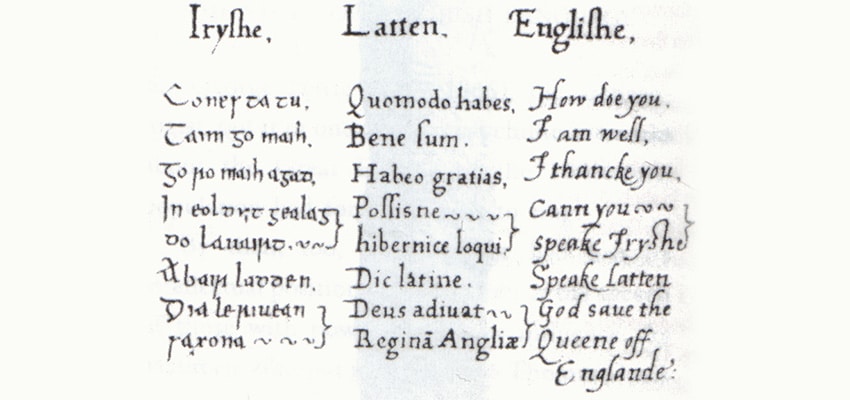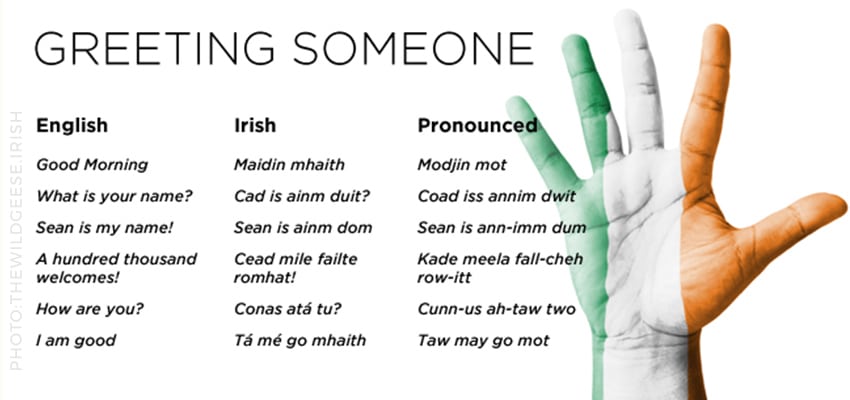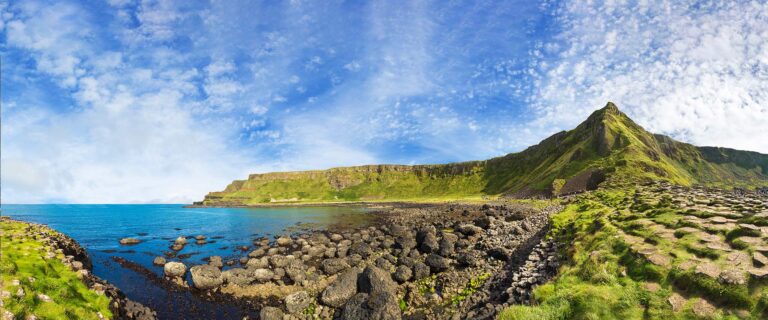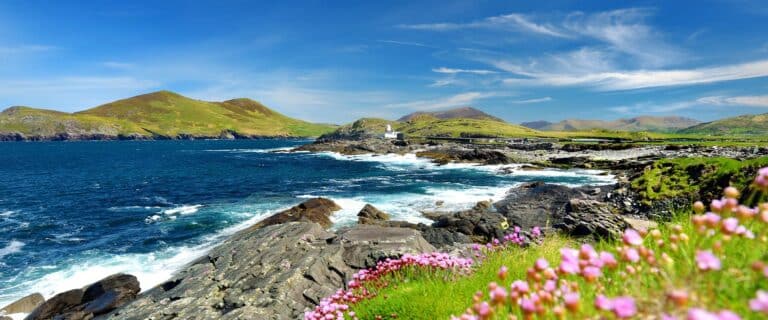It’s terrific to have a handle on Irish slang and lingo when you visit Ireland. Otherwise, you could spend much of your time scratching your head when you hear certain phrases or words. Also, you’ll miss a world of fun. Here’s a brief tutorial on the languages of Ireland and what you can expect to hear.
Irish Language History
There are two official languages in Ireland. Irish is the national language, and English, although spoken by the majority of people, is considered to be Ireland’s second language. Irish is a Celtic language, closely related to Scottish Gaelic, Welsh, and Breton. It was the language spoken by most people until the early 19th century. The shift to English happened quickly, and by 1891 it was spoken by 85% of the population. The early 20th century saw a national cultural revival and the establishment of an independent Irish State. Ireland now makes it a priority to preserve the Irish language and encourages citizens to be bilingual.
The Importance of the Irish Language
Today, 32% of the adults in Ireland claim knowledge of the language. Irish is mainly used in areas known as Gaeltachts, situated along the western seaboard. (A State authority, Udaras na Gaeltachta, promotes industrial development in these areas.) Bord na Gaeilge (the Irish Language Board) promotes the use of Irish throughout the country and as a core school subject. A growing number of schools, known as Gaelscoil (all-Irish Schools), offer tuition exclusively through the Irish language. Radio na Gaeltachta broadcasts nationally in Irish, and a new Irish language television service, Telifís na Gaeilge was launched in November 1996. When you’re in Ireland, tune in!
Understanding the Accent
One of the most common problems visitors have is understanding the locals and their Irish slang. Although English is the spoken language, it is often accompanied by a very thick accent, especially in rural areas. Listening well to country folks as they speak is the best way to figure out what they’re talking about, but we believe we may be of some help.
Common Irish Slang
Bags; to make a bags of something = make a mess of something
To be banjaxed = to be broken or tired
Bird(s) = Girl(s)
Biscuit = Cookie – not to be attempted with gravy!!
Bold; to be bold = to be naughty
Bonnet = Hood (of a car)
Boot = Trunk (of a car)
Chips = French fries
Codger; you ‘ould codger = Joker – usually associated with an elderly male
To come down in the last shower = To be naïve/ wet behind the ears
Craic = Fun
How’s the craic? = How are you doing?
Crisps = Chips
Culchies = Semi-insulting term for rural people used by city-dwellers
To eat the head off = To verbally abuse
Eejit = Idiot/ fool
Fair play to you = Well done, approval of one’s actions or opinions
Feck = A slightly more polite version of the other infamous F-word
Fluthered, blocked, langers, sloshed, stocious = all kindly expressions for being drunk!
Foostering; fostering about = Making quite a fuss without really accomplishing anything
Full shilling; He’s not the full shilling = He’s not mentally competent
Gas; We had great gas/ He’s a gas man = We had great fun/ He’s a funny guy
Giving-out (about someone) = Scolding; speaking negatively (about someone)
Go away out of that = You must be joking
Gob = Mouth
Gobdaw/ Gobshite = Idiot/ fool
Guff; Don’t give me any of your guff = Don’t give me your excuses/ disrespect
Having someone on = Joking with someone
Hames; You made a hames of it = You made a poor job of it
Header; That fella’s a header = Mentally unstable person
Jackeens = semi-insulting term for Dublin people used by culchies!!
Jacks/ Bathroom/ Toilet = Restroom
Lad(s); One of the lads = One of the gang, male or female
Jaded = Tired/ Exhausted
Letting-on; I was just letting-on = I was just pretending
Lively; Get out that door fairly lively = Quickly; Leave the room with speed!
Messages = Groceries
Mot = Girlfriend
Petrol Station = Gas Station
Pictures; Want to go to the pictures? = Movies; Want to go to the Movie Theater
Puck; He got a puck in the gob = Punch; He received a sharp blow to the mouth!
Pull Your Socks Up = Get Busy
Puss; She had a right puss on her = She had a sulky/ petulant expression
Shook; He was very shook looking = He looked disturbed/ shaken-up
Slagging; I’m only slagging you/ Taking the piss = Good-naturedly making fun of someone
Scratcher; He’s just out of the scratcher = He’s just out of bed
Sleeveen = Sly, calculating person
Topper; He’s a topper = A term of praise usually reserved for the young; He’s a great lad
There you have it. You are now a graduate of the Authentic Vacations school of Irish slang. You’re ready to book the Ireland trip of your dreams and talk like a local. (Especially after enjoying an evening in a local pub!)
Wherever your Ireland vacation takes you, you’ll hear amazing words and entertaining turns of a phrase. Western Ireland may be your best bet for Celtic slang. Ask your Destination Expert what they suggest!











